人教版小学英语四大时态上课讲义
人教PEP版六年级下册英语四大时态总复习课件

2.行为动词的变化。 否定句:主语+don't(doesn't)+动词原形(+其他). 如:I don't like fast food.我不喜欢快餐。 注意:当主语为第三人称单数时,要用doesn't构成否定句。 如:He doesn't go to school on the weekend. 他周末不上学。 —般疑问句:Do(Does)+主语+(其他+)动词原形+其他? 如:—Do you often play basketball?你经常打篮球吗? —Yes,I do./No,I don't.是的,我经常打。/不,我不经常打。
6.I __h_a_v_e___(have)a fever and my nose hurts. 7.Jim is good at P.E.He gets up early and __d_o_e_s___(do)some sports every morning. 8.Tom ___is__g_o_i_n_g__t_o_/_w_i_l_l _g_o_(go)to plant trees next day.He _g_o_e_s____(go)to plant trees every year. 9.My father __l_ik_e_s___(like)__p_la__y_in_g____(play)baseball. 10.Yesterday the teacher told us the earth _g__o_e_s___(go)round the sun.
6.I'm ____d_r_a_w_i_n_g______(draw)a picture. 7.Yang Ling's hobby is ____m__a_k_i_n_g______(make)cakes. 8.Yang Ling __i_s_w__a_i_ti_n_g______(wait)for the bus now. 9.Look!Linda ____i_s_s_i_t_ti_n_g_____(sit)on the rock and ____li_s_t_e_n_i_n_g_____(listen)to the music. 10.You are ___p__la_y_i_n_g_______(play)with dolls.
小学英语四种时态表格式总结及讲义

1.一般现在时的肯定句的基本结构
(1)be动词:主语+is/am/are+其他。如:
He is a clever boy.他是个聪明的男孩。
We are from Australia.我们来自澳大利亚。
(2)行为动词:主语十行为动词(+其他)。如:
I have breakfast at seven o'clock in the morning.我早上七点钟吃早饭。
4.Everyone(say)she is a good girl.
5.Susan(do)some listening practice in the evening every day.
6.Mr Smith(go)to work by car?
7.The man(teach)us science on Saturdays.
3.用法:
(1)表示正在进行的动作。如:My father is cooking the dinner at the moment.
(2)表示现阶段正在进行的动作。如:The students are working on the farm these days.
(3)用现在进行时表示将来。
常用这种结构的动词有:go,come,leave,arrive,start,begin等,表示即将发生或安排好要做的事情。如:
易错提示:含有表示想法、喜好或者感觉的动作一般用一般现在时表达,而不用现在进行时。常见的动词有:want(想要),like(喜欢),love(爱),wish(希望),hope(希望),think(认为),understand(理解),mean(意思是),need(需要),see(看见),hear(听到),feel(感觉到)等。
小学英语四大时态讲解
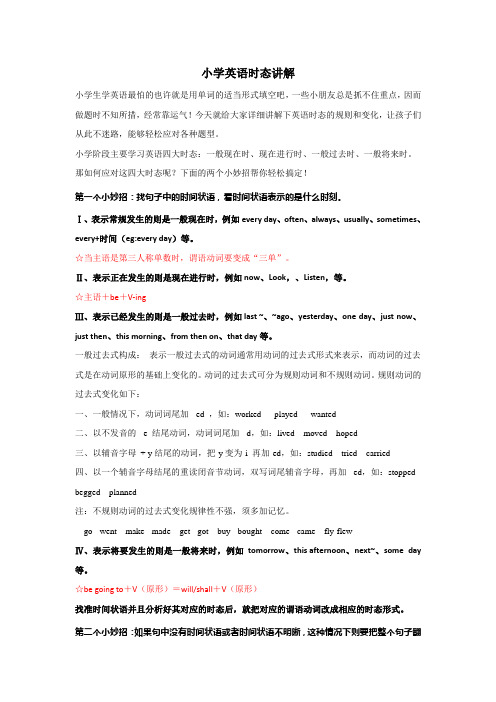
小学英语时态讲解小学生学英语最怕的也许就是用单词的适当形式填空吧,一些小朋友总是抓不住重点,因而做题时不知所措,经常靠运气!今天就给大家详细讲解下英语时态的规则和变化,让孩子们从此不迷路,能够轻松应对各种题型。
小学阶段主要学习英语四大时态:一般现在时、现在进行时、一般过去时、一般将来时。
那如何应对这四大时态呢?下面的两个小妙招帮你轻松搞定!第一个小妙招:找句子中的时间状语,看时间状语表示的是什么时刻。
Ⅰ、表示常规发生的则是一般现在时,例如every day、often、always、usually、sometimes、every+时间(eg:every day)等。
☆当主语是第三人称单数时,谓语动词要变成“三单”。
Ⅱ、表示正在发生的则是现在进行时,例如now、Look,、Listen,等。
☆主语+be+V-ingⅢ、表示已经发生的则是一般过去时,例如last~、~ago、yesterday、one day、just now、just then、this morning、from then on、that day等。
一般过去式构成:表示一般过去式的动词通常用动词的过去式形式来表示,而动词的过去式是在动词原形的基础上变化的。
动词的过去式可分为规则动词和不规则动词。
规则动词的过去式变化如下:一、一般情况下,动词词尾加-ed ,如:worked played wanted二、以不发音的-e 结尾动词,动词词尾加-d,如:lived moved hoped三、以辅音字母+ y结尾的动词,把-y变为-i 再加-ed,如:studied tried carried四、以一个辅音字母结尾的重读闭音节动词,双写词尾辅音字母,再加-ed,如:stopped begged planned注:不规则动词的过去式变化规律性不强,须多加记忆。
go - went make - made get - got buy - bought come - came fly-flewⅣ、表示将要发生的则是一般将来时,例如tomorrow、this afternoon、next~、some day 等。
人教版(PEP)小学英语小升初时态课件

四、一般过去时 一般过去时表示过去某个时间产生的动作或存在 的状态。 (一)时间状语:last year/week,yesterday,just now
(二)结构 1.肯定句:主语+was/were+其他. I was ill yesterday.昨天我生病了。 否定句:主语+was/were+not+其他. I wasn’t ill yesterday.昨天我没有生病。 一般疑问句:Was/Were+主语+其他?
当主语是第三人称单数时: ①肯定句:主语+动词第三人称单数+其他. She cleans the room every day. 她每天打扫房间。 ②否定句:主语+助动词(doesn’t)+动词原形+其他. She doesn’t clean the room every day. 她不是每天打扫房间。
二、一般现在时 一般现在时是表示经常产生的动作、存在的状态 或习惯性的动作的时态。常用的时间状语有:often, sometimes,usually,in the morning/afternoon/evening, every week/day/year等。
(一)构成 1.表示目前的状态,谓语动词用be动词。 肯定句:主语+be动词+其他.
时态
一、现在进行时 现在进行时表示现在正在进行或产生的动作。 (一)结构:be(am,is,are)动词+现在分词(动词-ing情 势) (二)现在进行时的标志词有now,look,listen等。 I’m playing football now. 我现在正在踢足球。
Look!The girl is reading a book. 看!那个女孩正在看书。 Listen!The bird is singing. 听!小鸟正在唱歌。
人教版小学英语语法--时态总结(一般现在时,一般过去式,现在进行时,一般将来时)教学文案
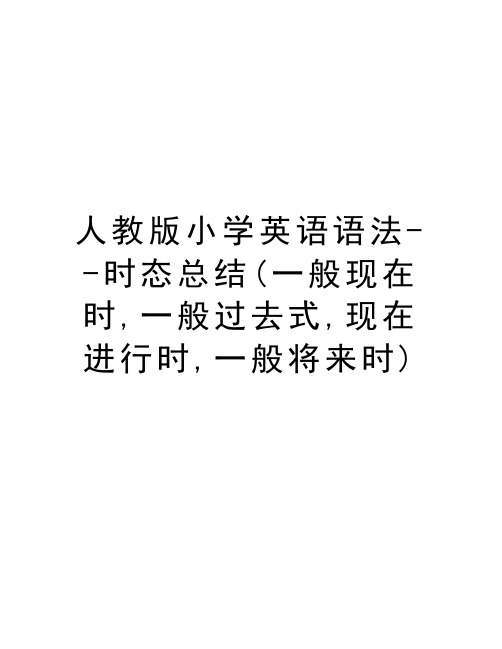
Listen, sheis singing.------Is she singing?
I am reading books now.-----Are you reading books now?(人称互换)
2、各时态问题解题技巧
①一般现在时
如果句中出现,usually,often,every等词时,该句子则为一般现在时态。做题时注意,如果主语是第三人称单数,则动词相应的改成第三人称单数就可以。主语是非第三人称单数,动词则不变。
带有行为动词的句子,改为一般疑问句方法:
Do/Does+人+动词(原型)+其他部分:
例题:Ivisitedmy grandmotherlast weekend.
Theyboughta new bike10 days ago.
Hewasillyesterday.
改为一般疑问句:Did +人+动词(原型)+其他?
③现在进行时
如果句中出现,look,listen,now等词(看,XX正在做某事;听,XX正在做某事;现在,XX正在做某事)。
现行进行时的句型:be+doing
(be动词的选用:I用am,he,she,it用is,其他单数人称用is,复数用are,you用are)
改为一般疑问句:Be+人+doing?(一二人称互换I--You,We-You,)
例题:Heis runningnow.--------Is he running now?
Theyoftenplayfootball after dinner.———Do theyoftenplay football after dinner?
小学英语语法-四大时态说课讲解

小学英语语法-四大时态四大时态复习1. 一般现在时(1)一般现在时的构成(肯定句)☆ be动词:主语+be(am,is,are)+其它。
如:I am a boy.我是一个男孩。
☆行为动词:主语+行为动词(+其它)。
如:We study English.我们学习英语。
☆当主语为第三人称单数(he, she,it)时,要在动词后加"-s"或"-es"。
如:Mary likes Chinese. 玛丽喜欢汉语。
(2)一般现在时的变化☆ . be动词的变化。
[否定句]:主语+ be + not +其它。
如:He is not a worker.他不是工人。
[一般疑问句]:Be +主语+其它。
如:-Are you a student? -Yes. I am. / No, I'm not.[特殊疑问句]:疑问词+一般疑问句。
如:Where is my bike?☆ .行为动词的变化。
[否定句]:主语+ don't( doesn't ) +动词原形(+其它)。
如:I don't like bread.当主语为第三人称单数时,要用doesn't构成否定句。
如:He doesn't often play.[一般疑问句]:Do( Does ) +主语+动词原形+其它。
如:- Do you often play football?- Yes, I do. / No, I don't.当主语为第三人称单数时,要用does构成一般疑问句。
如:- Does she go to work by bike? - Yes, she does. / No, she doesn't.[特殊疑问句]:疑问词+一般疑问句。
如:How does your father go to work?*动词+s的变化规则1.一般情况下,直接加-s,如:cook-cooks, milk-milks2.以s. x. sh. ch. o结尾,加-es,如:guess-guesses, wash-washes, watch-watches, go-goes 3.以“辅音字母+y”结尾,变y为i, 再加-es,如:study-studies2.现在进行时(1)一般现在时的构成: be(am,is, are)+ 动词的ing形式。
小学英语四种时态ppt课件

动词-ing形式的构成:
一般在动词原形后 go
+ing
ask
以不发音的e结尾 的,去e,+ing
write take
重读闭音节以一个 辅音字母结尾的, 双写这一字母+ing
get run swim
going asking writing taking getting running swimming
(一)肯定句: ①主语 + be动词的过去式 + 过去时间。
动词be 的过去时(was, were)
②主语 + 实意动词过去式 + 过去时间
took pictures, climbed mountains, …
(二)否定句:
一般过去时中变否定句,有be动词时,在was 或were后面加not,变成wasn’t或者weren’t; 在有实意动词的句子中在实意动词前加didn’t,
What is your father? 你爸爸是干什么的? What do you do every day? 你每天做些什么? When does your mother go to work every day? 你妈妈每天什么时候去上班?
6
注意,以下情况要使用一般现在时:
• 表示特征、性格和能力。如: Lifeng is a tall boy. 李锋是一个高个子男孩。 That's a big tree. 那是一棵大树。 My skirt is very new. 我的裙子很新。 She can speak English. 她会说英语。
4.What _a_r_e__(be) you doing (do)
now.
14
一般过去时(Past Simple)
四个重要小学英语时态ppt课件
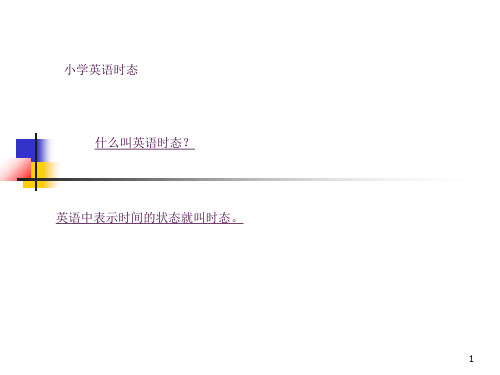
taking
talking
swimming closing driving
watching putting
16
现在进行时
1.Mr Zheng
i(sreraeda)dainbgook now.
2. The rabbits ——————a(rjeumjupm) npoinwg.
3.. Look ! Tom and John
like
eat
get
12
现在进行时
定义: 现在进行时表示现在或当前一般时间正在进行的动作
标志词 常与Listen,Look,now,…连用
13
句子结构:主语+be+动词的现在分词 I am listening now
口诀:我用am,你用are,is用在他她它,单数名词使用is ,复数名词使用are
21
will not=won't
否定形式:把be动词或will后面加not 例如:Jim is not going to play football.
Jim will not play football. 一般疑问句:把be动词或will调到句首, 例如:Is Jim going to play football?
swimming, run-running, …
15
现在进行时
study____studmyaikneg____ stop_____ come____ have____stoprpuinn_g___ wash___ begin—— take—— havtainlkg——
washing
swim__m_a_king close_____ drive___c_o_ming watch___ put—r—unning
小学英语四种时态 谢PPT课件

4.There are (be)four seasons in a year.
5.Lily ____is____ (be) a tall girl. 6.I go (go)shopping once a week.
10
现在进行时(Present Progressive)
概念: 表示现在正在发生的动作h 或存在的状态
2. 表示经常发生的或习惯性的动作。如: I get up at seven every day. 我每天7点起床。 Classes begin at eight.8点开始上课。
3. 表示客观事实和真理。如:
There are seven days in a week. 一周有七天。
The earth goes around the sun. 地球绕着太阳转。
(四)提问谓语: What did + 主语+ do…? 如:Tom did his homework last night.
What did Tom do last night?
15
动词-ed形式的构成:
在动词后加-ed
want
以字母e 结尾的动 词,只+d
“ 辅音字母+y ” , 变y 为i, 再+ed
8
1.The twins ___w__a_s_h____(wash) the
clothes every day.
2.Sometimes he __p_l_a_y_s__ (play)
basketball over there.
3.How often d_o__e_s Sally _s_i_n_g__(sing)?
7
注意,以下情况要使用一般现在时:
小学英语四种时态91034省公开课获奖课件说课比赛一等奖课件
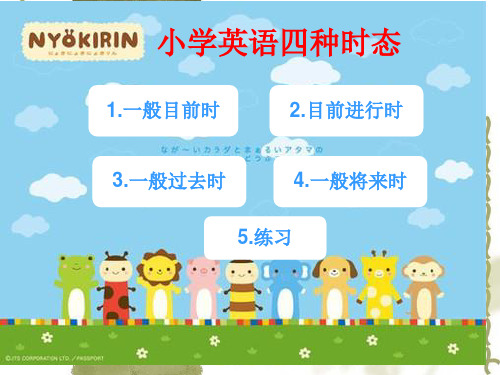
❖ ( )3. Can I______ this book? ❖ A. have B. has C. had
❖ ( )4. I to music at 7:00 this morning. ❖ A. listen B. listened C. listening
动词-ing形式旳构成: go ask write take get run swim
going asking writing taking getting running swimming
1.The twins a__r_e_w__a_s_h_in__g(wash) the
clothes now.
动词第三人称单数形式旳变化规则 1.一般情况下,直接加-s,
如:cook-cooks, milk-milks
2.以s. x. sh. ch. o结尾,加-es, 如:guess-guesses, wash-washes, watch-watches, go-goes
3.以“辅音字母 y”结尾,变y为i, 再加-es, 如study-studies
一般将来时
(一)谓语形式:
1.be going to + V.原形 2.will + V.原形 3.want 用目前时表将来 (二)提问谓语: 1.What is/ are +…going to do…? 2.What will + 主语+do…? 如:He will play basketball next week.
4.There are (be)four seasons in a year. 5.Lily ____is____ (be) a tall girl. 6.I go (go)shopping once a week.
小学英语四大时态复习课件
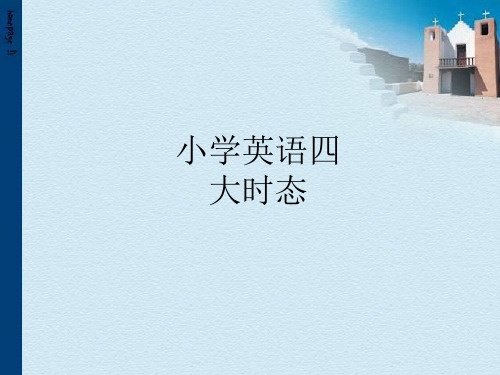
2. 当 主 语 是 单 数 第 三 人 称 时 , 它与助动词Does有关,但是 动词谓语一定要恢复为原形。 当主语是其他人称时,它与 助动词Do有关。
I like English. She likes it very much. We go to work by bike.
否定句
I don’t like English.
教学重、难点
2、一般过去时 The Simple Present Tense
一般过去时
➢一般过去时指动作发生在过去
➢有时候会有例如yesterday,last year等表示 过去时间的标志
➢一般过去时主要要注意动词的变化
be动词和实意动词
含有be动词的一般过去式
• She is in Beijing. • She was in Beijing . • I am a student. • I was a student. • We are friends. • We were friends.
看那些乌云要下雨了. Loot at the dark clouds. It _i_s_g_o_i_n_g_t_o_rain.
• 3. be +v-ing
go, come, leave, start, arrive, stay, fly, land, take off等动词可用现在进行时表示安排
和计划或即将发生的动作。
I am a teacher. You are a worker. He is a student.
We are friends.
Are you a teacher?
疑 问
Are you a worker?
句 Is he a student?
小学阶段四种时态串讲共23页

60、人民的幸福是至高无个的法。— —西塞 罗
谢谢你的阅读
❖ 知识就是财富 ❖ 丰富你的人生
71、既然我已经踏上这条道路,那么,任何东西都不应妨碍我沿着这条路走下去。——康德 72、家庭成为快乐的种子在外也不致成为障碍物但在旅行之际却是夜间的伴侣。——西塞罗 73、坚持意志伟大的事业需要始终不渝的精神。——伏尔泰 74、路漫漫其修道远,吾将上下而求索。——屈原 75、内外相应,言行相称。——韩非
小学英语四种时态演示文稿

一般现在时的构成
1. 肯定句
(1)主语+am / is / are+表语 They are new students. 他们是新生。 (2)主语+行为动词+其它 I read English every night. 我每天晚上读英语。
第4页,共28页。
2. 否定句
(1)主语+am / is / are+not+表语 She is not a teacher. 她不是老师。
❖ 3、Yesterday afternoon they their English teacher.
(三)一般疑问句 有be动词的句子中,把be动词提前即可(was / were 放
主语前) ,回答时用be动词回答;有实意动词时,需要助动
词did的帮助,将did提前即可,也就是主语前加did (动词还 原) ,回答时用did回答,注意人称的变化及将实意动词 过去式改为实意动词的原形.
(四)提问:
What? When ? Where? How?
A. was
you last night? B. are C. were
❖ ( )8. Can I TV? Sure.
❖
A. watching B. watch C. watched
❖ ( )9.She like summer.
❖
A. doesn't B. don't C. didn’t
❖ ( )10. There _______ a table in Jenny’s room.
第7页,共28页。
注意,以下情况要使用一般现在时:
• 表示特征、性格和能力。如: Lifeng is a tall boy. 李锋是一个高个子男孩。 That's a big tree. 那是一棵大树。
- 1、下载文档前请自行甄别文档内容的完整性,平台不提供额外的编辑、内容补充、找答案等附加服务。
- 2、"仅部分预览"的文档,不可在线预览部分如存在完整性等问题,可反馈申请退款(可完整预览的文档不适用该条件!)。
- 3、如文档侵犯您的权益,请联系客服反馈,我们会尽快为您处理(人工客服工作时间:9:00-18:30)。
人教版小学英语四大时态人教版小学英语四大时态(一般现在时、一般过去时、一般将来时、现在进行时)练习题集锦一、用动词的正确形式填空1. I ________ (do) my homework every evening.2. We _______ (fly) kites in the park on Sundays.3. My mother ________ (clean) our room on Sundays.4. Tom _______(play) the piano every Saturday. Now he______ (play).5. She _______(like) swimming. She ______ (swim) this weekend.6. Usually my mother _______ (wash) the dishes after lunch. But my gra ndma_______ (wash) today.7. Look at the man! He ______ (read) a magazine.8. Look! The plane ________ (fly) over the building.9. Listen! My aunt ________ (sing) in the room.She is a singer. She _ ____ (like) singing. She _______(have) a music show. She is excited. 10. Tom and Mike always ______ (swim) in the river. They _____ (swim) in the swimming pool this Sunday. Look! They ______ (swim).11. What ______ you usually ______ (do) in the evening?I _______ (play) computer games.12. What _______ you _______ (do) now?I _______ (make) a paper plane.13. What _______ he _______ (do)?He ______ (dance).14. What _______ she ______ (do) yesterday?She ______ (visit) her grandparents.15. ______ your mother ______ (read) newspaper in the morning?Yes, She ________ .16. _______ you _______ (like) fishing?No, I ______ . I like ______ (swim),but my brother ______ (like).17. How ______ your father _______ (go) to work every day?He ______ (go) by bike. But it’s cold today. He ______ (take) t he No.21 bus,, and he _______ (go) to work by taxi yesterday.18. _______ the monkey _______ (like) climbing trees? Yes, it _______ .19. What _______ your father ______ (do) after lunch? He _______ (read)a comic book. What _____ he _______(do) today? He _______ (clean) the kitchen for my grandma. Look! He (clean).20. ________ you ______ (collect) stamps? Yes. I _______ .________ your brother ______ (collect), too? No, he ________ .二、选择题1. _____ he _____ to the park at 6:30 in the morning? No,he _____ .A. Does; goes; doesB. Does; go; doesn’tC. Does; go; does2. What colour _____ you _____ this bookcase? I _____ it pink.A. are; going to paint; am going to paintB. do; paint; paintC. did; paint; painted3. Tim always _____ a picture at home. He _____ a car now.A. draws; is drawingB. draw; drawC. draws; draw4. She usually _____ her friends. They often _____ tea.A. see; drinkB. sees; drinksC. sees; drink5. He usually _____ the dishes at night, but tonight he _____ clothes.A. wash; washB.washes; is going to washC. is washing; was hes6. Mr. Green usually _____ his newspaper in the evening, but he and h is wife _____ television yesterday evening.A.reads; watchesB.reads; is going to watchC.reads; watch ed7. Where are the man and the woman? They _____ near the tree.A. sitB. satC. are sitting8. _____ your penpal _____ diving? No, he _____ .He ______ writing sto ries.A. Does; like; doesn’t;likesB. Does; likes; doesn’t;likeC. Do; like; don’t;likes9. _____ you _____ fishing yesterday? No, we _____ .A. Does; go; doesn’tB. Did; go; didn’tC. Do; go; do n’t10. Open the window, Please. Look! He _____ it.A. opensB. is openningC. is opening11. I usually _____ some milk every day. But I _____ coffee yesterday.A. drink; drankB. is drinking; drinkC. drank; am drink ing12. Mr. Green often _____ his newspapers at night. But he _____ an in teresting book tonight.A. reads; readsB. reads; readC. reads; is going to read13. The old man _____ playing sports in the park. He _____ morning ex ercise now.A. likes; is doingB. likes; doesC. like; doin g14. What _____ you usually _____ in the evening? I ______ computer gam es.What _____ you _____ last night? I _____ a book.A. do; do; playB. did; do; playedC. does; do; p laysdid; do; read do; do; read do; do; am reading15. Where ______ the boy _____ ? He _____ across the river now.A. does; swim; swimsB. is; swimming; is swimmingD. is; swimming; is swimming16. _____ you _____ to music now? Yes, we _____ .A. Do; listen; doB. Did; listen; didC. Are; listening; are17. Put on you coat, please. OK. I ______ it on.A. am puttingB. am going to putC. put18. _____ you ______ coffee? Yes, I ______ .A. Do; like; doB. Did; like; didC. Are; like; am19. Look! Two cats ______ across the wall.A. runB. runsC. are runnin g20. She _____ tea, but he _____ .A. likes; doesn’t B; like; don’t C. like; doesn’t。
